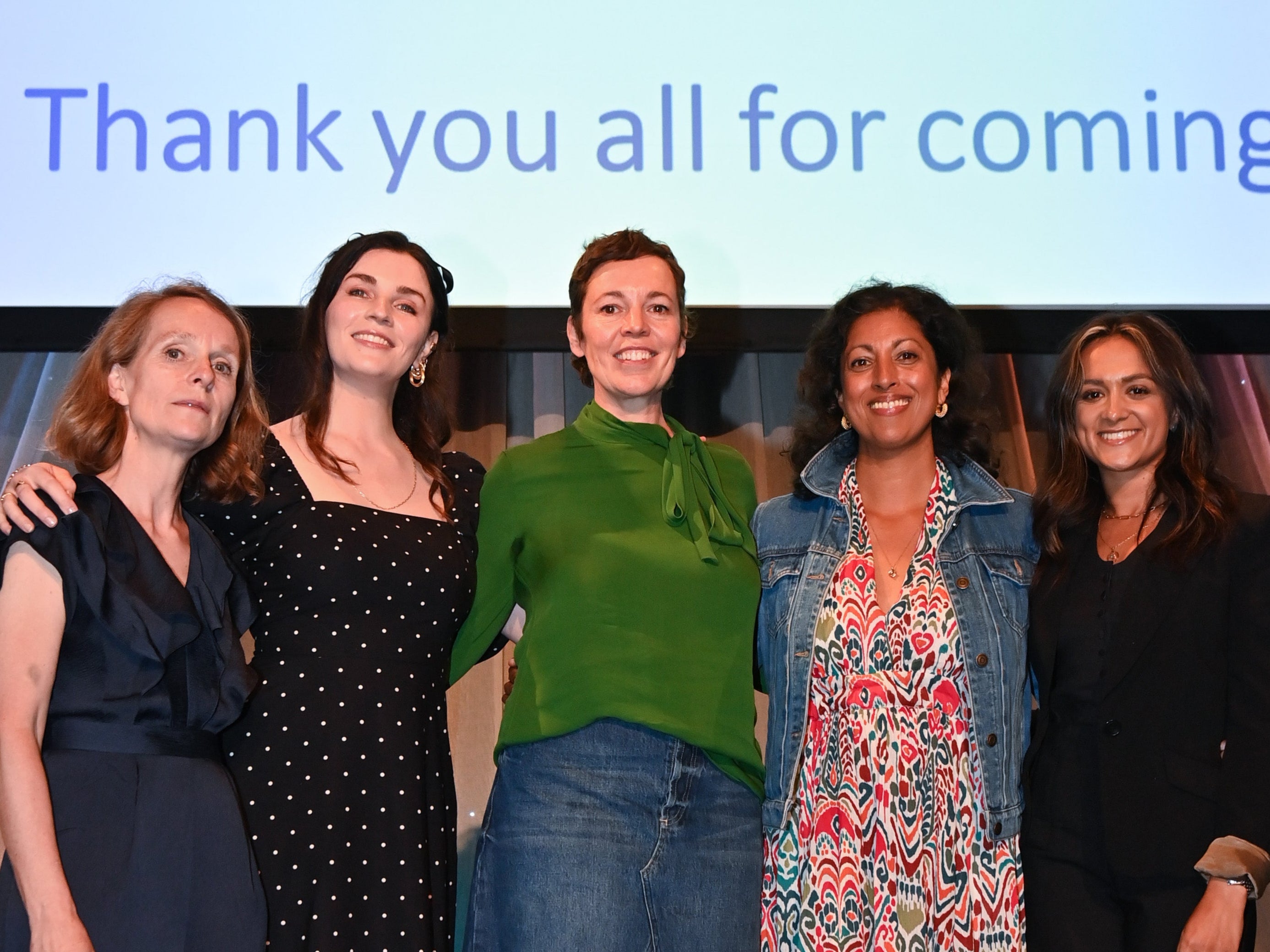Olivia Colman’s fight to end domestic abuse: ‘Women are still expendable’
The Oscar-winning star talks to Maya Oppenheim about how she became ‘obsessed’ with campaigning against domestic abuse, and why respect matters in relationships


Your support helps us to tell the story
From reproductive rights to climate change to Big Tech, The Independent is on the ground when the story is developing. Whether it's investigating the financials of Elon Musk's pro-Trump PAC or producing our latest documentary, 'The A Word', which shines a light on the American women fighting for reproductive rights, we know how important it is to parse out the facts from the messaging.
At such a critical moment in US history, we need reporters on the ground. Your donation allows us to keep sending journalists to speak to both sides of the story.
The Independent is trusted by Americans across the entire political spectrum. And unlike many other quality news outlets, we choose not to lock Americans out of our reporting and analysis with paywalls. We believe quality journalism should be available to everyone, paid for by those who can afford it.
Your support makes all the difference.Olivia Colman has been campaigning against domestic abuse for a decade. But ask the Oscar winner why there remains such a lack of political will to tackle the issue, and she’s lost for words. “I wish I had the answer for that,” she replies, her eyes twinkling, as she sits in a dressing room at the Unicorn Theatre. “I am mystified.” Year after year, an average of between two and three women are killed by a current male partner or ex-partner each week in England and Wales, while one in four women is thought to endure domestic abuse during their lifetimes.
Homicides of women often do not make the news, she tells me. Yes, occasionally, “there is outrage and there are marches”, she adds, but too often the outcry quickly dissipates. In Colman’s view, the inaction could stem from our collective desire to “bury their heads in the sand” and “prioritise” other matters. “They get outraged for a minute and then it’s like there is a peak, and then you just know it’s going to go off the radar,” she says, although she wonders if the issue lies in the continued belief that “women are still expendable”. She has a point when she asks, “If it was between two and three men killed a week, would that make a difference?”
On the day we meet, Colman is gearing up for an awards ceremony held by the arts charity Tender, of which she has been a patron for almost a decade. Tender uses a range of creative projects – including drama workshops – to teach children and young people about the early signs of domestic abuse, but also what healthy, loving and fulfilling relationships look like. This is particularly important, Colman stresses, when you consider that young people aged 16 to 24 are the “most at risk group” for experiencing domestic abuse. This is an age where people are still “working out” how relationships work and may, out of naivete, wrongly see jealousy from boyfriends as a “sign of love”.
It is not unusual for actors and high-profile figures to champion a gamut of worthy causes, but it is unusual for their campaign work to be as genuine and heartfelt as Colman’s. If anything is clear from our time together, it is the fact she cares deeply about this harrowing and prevalent crime, which has a higher rate of repeat victimisation than any other. It was while playing a domestic abuse victim in the 2011 film Tyrannosaur that Colman became interested in the issue. She got in touch with Refuge, a leading charity in the sector that is England’s largest provider of shelters for domestic abuse victims, who provided her with case studies of women who had endured domestic abuse.
“My questions at the time were similar to many people who know little about it,” Colman explains. “You know, ‘Why don’t you leave?’, and, ‘Were there more cases in different socioeconomic backgrounds?’ They said no – ‘it’s across the board’. Some of the case studies I saw were so upsetting. I mean, if you did write a film about it, you wouldn’t believe it.”
It was then that Colman became “slightly obsessed” with the issue of domestic abuse. It can happen to anyone, she adds. “Any woman on the train or bus, and you wouldn’t know, and men too.” The goals and methods of Tender struck an immediate chord with Colman as her thoughts turned to her own three children.
If between two and three men were killed a week, would that make a difference?
“My kids were little and I loved the idea that they could have these workshops and learn because my kids come from a family where we don’t fight,” she adds. “Many people think ‘that’s odd’. I mean, not even healthy fighting. We just don’t fight. And my sister, who’s a psychotherapist, said, ‘I mean, that’s great, but your kids never see conflict resolved”.
Her children’s lack of exposure to arguments made Colman wonder whether they would know what to do if they encountered conflict later in life, in friendships or in a relationship. “I’m not sure they’d know what to do if they saw conflict,” she reflects. “And that is the case for many kids. But there are also many kids who see conflict every day as an example. And how do they know that that there is another way of doing it?”

Her husband compares the preventative work Tender does to tackle domestic abuse to the 2002 film Minority Report. In the futuristic film, technology enables police officers to ensnare criminals before a crime is perpetrated; Tender strives to tackle and root out domestic abuse before it happens. “I do use the word beautiful for what you do,” Colman says, turning to the charity’s chief executive Susie McDonald, who is sat beside her. “It is generationally life-changing.”
Coercive control is an issue that has become far more widely discussed since Colman first started working with the charity. Yet, despite growing awareness, Colman insists people need to be better educated on the cruel machinations of this crime. For the record, coercive control is defined as psychological abuse and controlling behaviour in a relationship, with abusive partners isolating their victims from loved ones or controlling their finances. Coercive control became a crime in England and Wales in 2015 under the Serious Crime Bill; the Domestic Abuse Act, which became law in the spring of 2021, introduced the first-ever statutory definition of domestic abuse to include economic abuse and controlling and manipulative behaviour that is not physical.

Worryingly, a study previously covered by The Independent found millions in the UK have no understanding of the meaning of coercive control despite the fact the offence is illegal. The report, by a domestic abuse charity called Hestia, discovered that four in 10 adults in the UK say that their perception of coercive control is either weak, or totally nonexistent. Meanwhile, over a quarter of those polled were found to have been in a relationship where they deemed themselves to be subjected to coercive control. Colman stresses it is “valuable” for everyone in a relationship to stop and reflect on whether they are approaching things in a “reasonable or unreasonable” way.
But what is the basis for a happy and healthy relationship? “I think it’s based on mutual respect,” she reflects. “It’s equality.” And it is ultimately this that Tender’s workshops strive to teach children and young people. They have tangible figures to back up their impact: a school in South London reported a 60 per cent reduction in negative behaviours after one of Tender’s workshops.
“If you’re going into a first relationship knowing about kindness and respect, it’s going to set you on a good path for future happiness,” Colman adds. “Everyone will encounter some sort of relationship every day; a postman, a person in the shop, your best friend, your lover. And if you know how to navigate those stepping stones, you are going to have a happier life. And I can’t see how anyone wouldn’t want this for every child. It must be put down in the law.”
To find out more about Tender’s work go to www.tender.org.uk
The national domestic abuse helpline offers support for women on 0808 2000 247, or you can visit the Refuge website. There is a dedicated men’s advice line on 0808 8010 327. Those in the US can call the domestic violence hotline on 1-800-799-SAFE (7233)
Other international helplines can be found via www.befrienders.org



Join our commenting forum
Join thought-provoking conversations, follow other Independent readers and see their replies
Comments